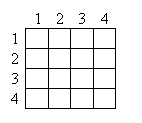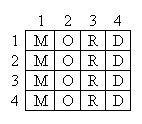avetrol
n. a bastard
uzzard
n. a third-generation bastard
avetrol
n. a bastard
uzzard
n. a third-generation bastard
youward
adv. toward you
NINETY-SEVEN is the longest number name with strictly alternating vowels and consonants …
… unless you count NEGATIVE NINETY-SEVEN.

An Austrian army, awfully arrayed,
Boldly by battery beseiged Belgrade;
Cossack commanders cannonading come,
Dealing destruction’s devastating doom;
Every endeavour engineers essay
For fame, for fortune, forming furious fray;
Gaunt gunners grapple, giving gashes good;
Heaves high his head heroic hardihood;
Ibraham, Islam, Ismail, imps in ill,
Jostle John, Jarovlitz, Joe, Jack, Jill,
Kick kindling Kutosoff, kings’ kinsmen kill;
Labor low levels loftiest, longest lines;
Men marched ‘mid moles, ‘mid mounds, ‘mid murd’rous mines.
Now nightfall’s near, now needful nature nods,
Opposed, opposing, overcoming odds.
Poor peasants, partly purchased, partly pressed,
Quite quaking, Quarter! quarter! quickly quest.
Reason returns, recalls redundant rage,
Saves sinking soldiers, softens seigniors sage.
Truce, Turkey, truce! Truce, treach’rous Tartar train!
Unwise, unjust, unmerciful Ukraine!
Vanish, vile vengeance! Vanish, victory vain!
Wisdom wails war — wails warring words. What were
Xerxes, Xantippe, Ximenes, Xavier?
Yet Yassey’s youth, ye yield your youthful yest,
Zealously, zanies, zealously, zeal’s zest.
— William T. Dobson, Literary Frivolities, Fancies, Follies and Frolics, 1880
A phonetic puzzle by Woody Rowe:

Across
1. What mosquitoes do.
2. What snakes do.
3. What dogs do.
4. What teeth do.
Down:
1. Insects
2. Optical organs
3. Annoy
4. Comfort
The solution:

Get it? Remarkably, the same idea works in French:

Across
1. Que font les moustiques
2. Que font les chiens
3. Que font les serpents
4. Que font les dents
Down
1. aime
2. au
3. air
4. dé

cark
v. to worry
kedogenous
adj. produced by worry
Some of your hurts you have cured
And the sharpest you still have survived,
But what torments of grief you endured
From evils which never arrived!
— Emerson
bubulcitate
v. to cry like a cowboy
(That’s from Henry Cockeram’s English Dictionary of 1623, so it doesn’t refer to a cowboy of the American West. What it does refer to is unclear. Cockeram said he included “even the mocke-words which are ridiculously used in our language,” but this word appears never to have been published outside of his dictionary, so we don’t know what a “cowboy” is or why he might cry. Make up your own meaning.)
AMERICAN is an anagram of CINERAMA.
MEXICAN is an anagram of CINEMAX.